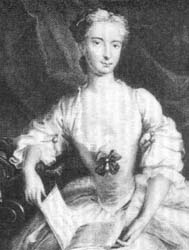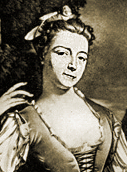Kitty Clive
Catherine "Kitty" Clive (* November 5, 1711 in London, † December 6, 1785 in Twickenham ) was an English actress and soprano who has achieved considerable success on the stages of capital in the first half of the 18th century and about also active as a writer of plays, librettos and lyrics. She was one of the favorite actresses David Garrick, even if they were not always a professional opinion over the decades of passionate collaboration. In addition, she used long-lasting friendships with the great cultural figures of her time, such as George Frideric Handel, Horace Walpole and Samuel Johnson.
Life
Kitty Clive was born as Catherine Raftor. Her father William Raftor was an Irish lawyer from Kilkenny. William Raftor had served as an officer in the army of Louis XIV, because he had fought in the Battle of the Boyne for the former King of England James II and spent years in exile in France before pardoned Queen Anne.
With about 17 years ago Catherine Raftor occurred at the Theatre Royal, Drury Lane on the first time. The former manager of the theater, Colley Cibber, had become aware of her and cast her as Ismene in Nat Lee's tragedy Mithrades, King of Pontus. Shortly thereafter, she married George Clive, a criminal defense lawyer and relatives of Baron Clive. The marriage failed and they quickly returned to acting.
In the early 1730s, she had completely established itself as a popular actress of leading roles, which she preferred comedies. One of the few exceptions was the role of Portia in William Shakespeare's The Merchant of Venice, where they, together with Charles Macklin, who embodied the Shylock, occurred. However, they did not expect even this role to their successes. In 1747 she was one of the founding members of David Garrick's acting company.
As a soprano Kitty Clive also appeared occasionally in opera performances, so they played significantly the roles of Emma and Venus in Thomas Arne's opera mask Alfred 1740. Moreover, they designed in 1743 the role of Delilah in George Frideric Handel's oratorio Samson. More singing roles she had mime in William D' Avenants adaptation of William Shakespeare's Macbeth ( 1735), Henry Woodward's The beggar 's - or, The contending COLOMBINES ( 1736), where she performed a duet with Susannah Maria Cibber, in Arnes Comus and Henry Carey's Calliope ( 1739 ) or John Frederick Lampe's musical pantomime Colombine courtezan. Straight from the period around 1740 are diverse song drafts from her hand for musical compositions by Thomas Arne and Henry Carey and Aileen aroon. An Irish ballad. obtained, which lead to the conclusion that they already operated also as a songwriter at that time. Especially their adaptation of choral and instrumental works of Handel led to a to hedge its glory as a critic around 1733 were looking for a scapegoat for declining attendances at Drury Lane. But a friend of her Handel benefited from this artistic exchange.
Her stage career, she spent except for a short intermezzo in 1741 in Dublin solely in London, spanned over 40 years and after KA Crouch they belonged on the income of the very best actresses of her generation. Clive also dabbled with some success at writing short plays, such as 1753 The Rehearsal.
In April 1769 she retired from the stage with a spoken epilogue in The Apprentice and the role of Violante in The Wonder back in order in their small villa in Twickenham, called Little Strawberry Hill or Clive 's Den to live, that she as a gift from her friend Horace Walpole had received. She died there in 1785 and took place in Twickenham final resting. A poem on their plaque praised her charity. Another of her friends, Samuel Johnson praised, looking back over Boswell her humor and her wit: " Clive, sir, is a good thing to sit by. She always under stands what you say. In the sprightliness of humor, I have never seen equaled ago. "
Artistic Responses
Some porcelain figures of to represent by Thomas Frye led Bow Factory, the Kitty Clive and Henry Woodward as "the Fine Lady and the Fine Gentleman" in David Garrick's mythological burlesque Lethe (performances 1750-1752 ), are probably the first porcelain portraits of this quality in English porcelain, which were mass-produced for art lovers.
Baron Thomas Pitt Camelford published the poem in her honor on Mrs. Clive. David Garrick himself wrote in 1743 a satirical poem on a colleague, in which he described the reasons why Kitty Clive had rejected the role in Fielding's piece. Your friend Walpole devoted her the poem Inscription at Strawberry Hill.
Plays / Libretti
- Every woman in her humor. Farce in two acts. World premiere March 20, 1760, Theatre Royal, Drury Lane, Manager: James Lacy and David Garrick
- The Iceland of slaves - in two acts. Comedy in two acts. ( incomplete handed ) Premiere March 26, 1761, Theatre Royal, Drury Lane, Manager: James Lacy and David Garrick
- The sketch of a fine lady's return from a rout. Farce. One-act play. World premiere March 21, 1763, Theatre Royal, Drury Lane, Manager: James Lacy and David Garrick
- The faithful Irish woman. Farce in two acts. Premiere on March 18, 1765, Theatre Royal, Drury Lane










